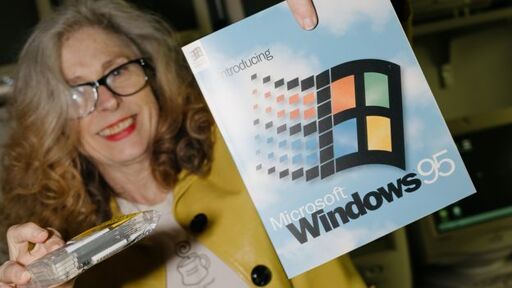At my old workplace, there was numerous XP machines still going. They were running old machine equipment, and basically served as a controller for the entire machine.
As it turns out, it was cheaper to keep these XP stations, instead of buying a completely new Hydrolic press, or whatever it was running, which cost several hundred of thousands of dollars.
One day one of these computers stopped working, and we immediately tried to get the software to work on a brand new W10 replacement. Took us a week of drivers hell, until we eventually went to the basement, found an exact replica, and swapped the HDD over.
The company, making these heavy machineries, went bankrupt in the early 2000s, and there was literally no way of getting the software to run on anything besides that original box.
I’d like a law that software / hardware companies who file for bankruptcies must release the source / files for their tech to an open source repository.
That idea often comes up in these discussions and I’ve never really had an argument against. Best I got is that parts of that software may have moved to more modern stuff that was purchased by another company. But that’s a damned thin excuse not to implement this.
If you are a big company there are often ESCROW agreements for things like this. I have encountered the “data dumps” from time to time and whilst it’s “better” it’s not ideal. Half finished documentarian, virtual machines of mis-configured OS installs… it’s almost as if it was just a straight copy of the development environment as it was just as they made the final version of the software…
But it’s better than nothing.
Main issue I can see with this forcing open source would be libraries and frameworks licensed from others who would likely still be in business and wouldn’t agree to those parts becoming open sourced. See also WinAMP https://www.theregister.com/2024/10/16/opensourcing_of_winamp_goes_badly/
Yeah, and as long as these things never touch the internet, there really isn’t an issue.
I was tearing out ancient infrastructure for a new office and my eye kept going to a rectangular square box on the wall. Finally realized it was a PC! The cause of death was clear, PSU fan died, killed itself from heat. It was a form factor I had never seen, but standard nonetheless. It was running an answering machine system in DOS, still worked! Such a rare machine I’ve only found a single reference on the web and a single video about it. 1999, 486XS (I know, would kill for a DX, it’s soldered on), upgraded from 2x 2MB SIMMs to a whopping 2x 64MB SIMMs. Imagine what that would have cost in the day!
LONG story, but I got it running Windows 95b. 3.1 was just too much challenge to get it networked and happy. Much pain was removed when I got a USB floppy emulator. Can’t do jack without a floppy! Broke the network card drivers, need to start over. Had it running Doom with a legit SoundBlaster card and could RDP into over the network.
It was an amazing journey getting it all together and updated. Most of that knowledge is gone from the internet, and I sure don’t remember all the tricks. Going to be my first token ring machine! LOL, had to get parts from Romania and trash cans.
I binge people doing this type of thing on YouTube lol. I miss working in the industry
If you ever see yourself in the need of information about the DOS era again, Vogons is the place to go IMHO.
But it’s all in poetry, unfortunately.
Stuck or preferred choice?
Trapped using software they needed to buy once, vs rent?
Yes, stuck. There are enourmous problems with different institutions having to use ancient PCs because the software doesn’t work on modern ones, be they electron microscopes, hospitals or industrial machinery, causing e.g. enourmous security issues. This is one of the most important reasons why FOSS and why making FOSS software mandatory in government contracts is so important.
Also how come people can’t read the fucking article before commenting?
I’m a bit depressed that I finally need to upgrade my last windows 7 machine. It looks like it’s 10 for me now :-(
https://www.fedoraproject.org/ https://linuxmint.com/ https://archlinux.org/ https://www.debian.org/ https://elementary.io/ https://system76.com/pop/
There are many safe open source options. If you need help there are ample resources available. If you want to you can also DM me.
Yeah, I’m well aware. But how much of my time would it take to get a bunch of windows software running smoothly on Linux?
I do appreciate the offer of personal help, that’s an extremely generous offer to an internet stranger. Sincerely, thank you!
Check if there’s alternatives to what you use in Windows, or if there’s a Linux version. Decide if you need to use the windows program, or if the Linux equivalent will work. There may be a learning curve to using a different program, but I haven’t yet really found anything that doesn’t have an equivalent that isn’t a program paired with hardware that will only work with each other.
Depends on what software. Anything that happens in the browser works. A lot of other software can be run using Wine. There is some software which still has problems especially when using USB ports as serial ports etc. and a lot of subpar software (un)fortunately just doesn’t work because of it being badly programmed.
Removed by mod
Right? If it still works then it still works.
If the article was talking about anything other than tech/software, we’d be praising its longevity.
It really depends what its used for.
Anything that is public facing would never work without constant maintenance and upgrades, be it a computer OS or some complex piece of hardware.
Yup, also especially for industrial applications, requirements and needs absolutely can change, and that means having to work around the equipment. I have seen firsthand the experience of trying to get new features into ancient applications. (Made worse by the fact that we took on support for it because the original company which had created the program had gone under).
Ancient industrial machines use ancient windows computers. This has been known forever. There’s a whole niche industry of very expensive ram and hard drives and other components keeping this industry going
Yes i still use floppy disks regularly for my cnc plasma table
Yeah man. Details are going to be fuzzy here, but I think it was only in recent memory where Boeing upgraded the planes in Japan to no longer need floppy disks.
I run a computer on Win7 at work, because it needs some important legacy software. It can’t be containered because it has a nasty licence manager.
And my oscilloscope runs on Win98.
Good for them. If it works, it works. I wouldn’t connect it to the internet though.
I would bet there are still a few old pieces of industrial machinery around that I duct taped together by imaging an ancient PC and transferring it to a Virtual Box VM.
I would totally hang with that lady in the thumbnail lol
My wife still using windows 2000 on her laptop. Still boots and runs. She just doesn’t connect it to the internet.
I’d still be using Windows 7 if I could.
I mean, you can if you want to
It’s not safe and all that stuff.
Why do people keep repeating this tired propaganda? What exactly do you think will happen?
there’s a word for those people: awesome
windows xp was peak; running anything before xp is legendary
Idk, it was horrendously insecure, would freeze a lot, and missing creature comforts like window tiling.
Tbh I think you’re letting nostalgia blind you to XP’s flaws a little.
If they kept refining Win7 it would’ve been great.
I would still be using Windows 7 if it was safe to connect to the internet.
I can’t believe government systems are just open to cyber security like that.
Are there not cyber terrorists for some teenager that has tried to do anything with these unsecured systems?
Why would Windows 7 not be “safe” to connect to the internet? Do you understand how any of this works?
Lemmy is overloaded with people that puff up and want to present like they know things about tech, when they know basically nothing.
Get a hardware firewall, get basic safe practices in place, don’t do basic user operations as admin, and configure shit correctly. If you think that your OS is there to protect you, you are a tech foooooooooooooool
deleted by creator
I just connected my Windows 7 machine to the internet and two Russians jumped out my serial port! One is holding me down while the other one is stealing the CPU from my washing machine! Send help!
I hope they aren’t the hackers known as 4chan!
Well one did fuck me in the ass while the other one stole my favorite underwear right out from the delicate cycle. Total animals.
Well see the problem is you didn’t hot glue the cereal and milk port shut dummie
Just slap some bit defender on it. That’s all that we have to do with windows 10 and we’re all good to go. Hey if Linux can run on the same box for all these years and be safe theres no reason why any windows system can’t be safe with a simple add on.
Windows 11 is just a tmp chip added to board
Srsly that is all. Something smaller than a thumb drive changed and they are trying to convince the world to make more waste. It’s fucking stupid. Microsoft can eat fat ass.
Some might be surprised how many systems are still running on AS400s. IBM still makes and maintains IBMi, the modern iteration. My last company wrote our flagship product for these machines, all green screen. Our customers would sometimes move to our GUI product and jump right back to the prompt menus. Hey, if you gotta move fast and have a bulletproof system, text menus are the only way to fly!
By my god, the skill set for running and programming those beasts touches on almost nothing I’ve learned in 30+ years of IT work. Wish I had got experience in that part of the company, seen some solid job posts for that sorta tech.
I worked in the airline industry for years and learned a GUI overlay for one system and another entirely green screen system called SHARES (see if you can guess the airline). Honestly I kind of enjoyed working with those systems; there’s some refreshing “back to basics” feeling kind of like driving a manual transmission.
In my current job I’ve been using another legacy system. Well, my job was to create a relatively modern service for the legacy system to call, but none of the remaining developers knew how to use the extensions of that system that does SOAP calls. So I had to learn just enough of that legacy system to hold their hands through the parts that call my service. Kind of fun, to be honest!
SOAP calls
Now that’s a name I’ve not heard in a long time.
I worked with an AS400 while in vehicle logistics, those things are optimized for simple functions but high data throughput
“stuck” more like happy to not have to deal with the last 15-ish years of microsoft ruining everything they previously excelled at.
They lost me when they removed the start button on the left side of the taskbar in version 8.1 (I think it was) to… Be cool with the kids (I think 8.1 was supposed to be touch screen friendly)? I don’t even know, but I went back to Windows 7 for a long while.
The backlash with the start button was so huge that they put it back on the taskbar in Windows 10 (at least mine has it and is the reason I got Windows 10). I’m currently refusing to update to Windows 11, because it apparently crashes when playing certain video games and I’m not about to have the other trash bugs that come with it, which I’ve been seeing posted on Microsoft help forums when I search for Windows 10 related questions. Fuck that noise, I don’t want to deal with it.
They seemingly wanted to design the entire interface around touchscreen 2-in-1s. If you went in a Microsoft store around the time windows 8 came out, they were leaning really hard into the 2-in-1s. I got a surface pro 3 at that time that I used to take handwritten notes in school, and the windows 8 interface was honestly awesome with that use case. On my desktop PC, though, I held out updating from 7 until windows 10.
I have had better luck with game compatibility using proton on linux than I had with win 11
Windows 8 removed the start button, 8.1 brought back most all of the “legacy” UI features (which still persist today).
It might be. I remember buying a laptop at that time and it came with 8 and it annoyed me so dang much.
The dot net framework was ported to Windows 95/98 so they can use more software now.












